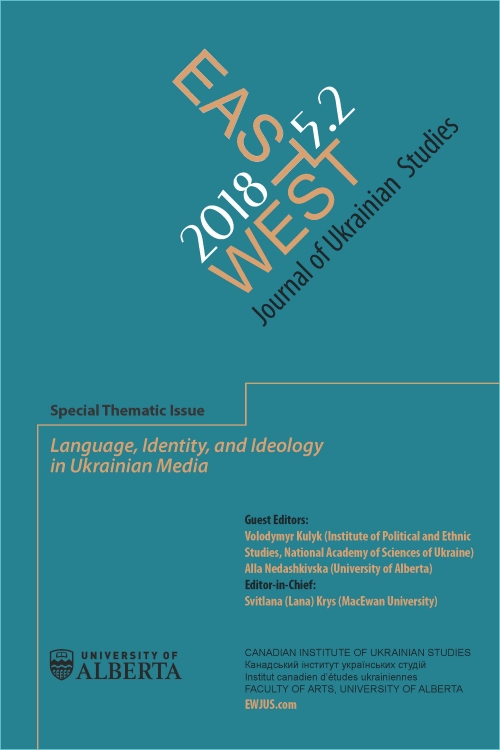Identity in Interaction: Language Practices and Attitudes of the Newest Ukrainian Diaspora in Canada
Identity in Interaction: Language Practices and Attitudes of the Newest Ukrainian Diaspora in Canada
Author(s): Alla NedashkivskaSubject(s): Language studies, Media studies, Identity of Collectives
Published by: Canadian Institute of Ukrainian Studies at The University of Alberta
Keywords: identity; interaction; language practices; language attitudes; diaspora; Ukrainian; Canada;
Summary/Abstract: The present study focuses on processes and transformations in language practices and attitudes in the newest wave of the Ukrainian diaspora in Canada, notably following the 2014 Revolution of Dignity in Ukraine. Specifically, multilingual language practices in social media and in off-line environments (Ukrainian, Russian, English), participants’ beliefs about language(s), and participants’ views about the language question are analyzed. The analysis also relates the speakers’ practices and beliefs to issues of identity construction and negotiation that are observable in the context of this diasporic community. The socio-cultural approach to studying identity in interaction developed by Bucholtz and Hall (“Identity”) is used as the premise for the main theoretical foundation of the study. In this framework, identity is defined as “the social positioning of self and other” and is best studied at an interactional level because it is in interaction that language resources gain social meaning (Bucholtz and Hall, “Identity,” 586). Basing the analysis on the “discourse-centered online ethnography” approach (Dailey-O’Cain 54), the data were collected from two sources: one social media communication network and in-person interviews with this network’s members. Therefore, the analysis combines a study of multilingual interaction in social media communication with an investigation of how participants report on their language practices overall, including their views about the language question. The domains of language and discourse about language constitute the organizational core of the analysis, as both contribute to the discussion of language attitudes and speakers’ shaping and reshaping of their identities. The domain of language incorporates a study of code-switching, including language choice and language practices of the participants, observed or reported. A discourse about language focuses on the importance of the language question to the participants, their positioning toward language(s), and/or language practices, as well as participants’ associations with and disassociations from particular languages, concepts, or entities. The discussion relates the functions of different languages in the studied community to larger questions of the diaspora studied. The prominence of “real” and “ideal” code-switching phenomena are highlighted. The code-switching, along with language choice and language practices, as well as discourse about language, are all shown to be resources employed by the speakers to position themselves in specific associations or disassociations. Overall, the study investigates the newest Ukrainian diasporic community, demonstrating how language practices in human interaction display and construct identity(ies) and signal participants’ negotiations of their own identities and those of others.
Journal: East/West: Journal of Ukrainian Studies (EWJUS)
- Issue Year: 5/2018
- Issue No: 2
- Page Range: 111-147
- Page Count: 37
- Language: English

